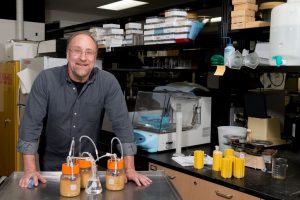Biodico is now delivering biodiesel to the University of California, Santa Barbara (UCSB), that was produced from used cooking oil collected at UCSB. The biodiesel will be used to fuel tractors and other diesel-powered equipment on campus. The renewable fuel was produced at Biodico’s “Zero Net Energy Farm” that went online in December of 2015 in the San Joaquin Valley.
 “Producing biodiesel for UCSB is symbolic of our philosophy at Biodico to provide sustainable solutions that are economically viable, good for the environment, and support the needs of local communities,” said Russ Teall, president and founder of Biodico. “As an alumnus I am proud to say that UCSB serves as an excellent example of a forward-thinking institution that puts into practice what many of its environmental studies courses are teaching: We need to find practical alternatives to fossil fuels.”
“Producing biodiesel for UCSB is symbolic of our philosophy at Biodico to provide sustainable solutions that are economically viable, good for the environment, and support the needs of local communities,” said Russ Teall, president and founder of Biodico. “As an alumnus I am proud to say that UCSB serves as an excellent example of a forward-thinking institution that puts into practice what many of its environmental studies courses are teaching: We need to find practical alternatives to fossil fuels.”
Mark Rousseau, Energy and Environmental Manager of UCSB Housing, Dining & Auxiliary Enterprises stated that the university’s relationship with Biodico is focused on sustainability and closing the loop – used cooking oil is collected from campus and then returned as biodiesel to be “re-used” on campus. “Biodiesel is not only cleaner for the environment and non-toxic to store, it reduces our fossil fuel purchases. This helps meet a UC-wide goal of carbon neutrality by 2025 since biodiesel is a low carbon intensity fuel,” Rousseau noted.
JJ Rothgery, Chairman of Biodico, added, “We are thrilled to work with UCSB to help implement a program that is changing the narrative in how universities and other organizations utilize byproducts to create biofuel that is cost effective and environmentally sound. As Biodico’s ZNEF concept continues to gain traction, we look forward to implementing fully sustainable solutions in similar settings across the country.”










